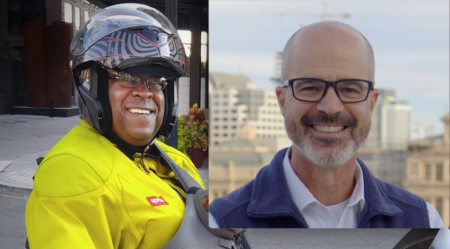The UK’s Modern Transport Bill, which was announced by The Queen at the State Opening of Parliament yesterday (May 18), has drawn support from London’s GATEway project one of the UK’s key autonomous vehicle test beds and from across the transportation and insurance industries.
The bill promises to ease legislative barriers around the testing of autonomous vehicles as well as obliging insurers to cover the risks associated with such technology. Announcing the bill, the Queen said it would “ensure the UK is at forefront of technology for new forms of transport, including autonomous and electric vehicles”.
“It’s great that we have the Queen talking about this technology,” GATEway technical lead Professor Nick Reed (right), tells Traffic Technology Today. “It shows that the impact that this kind of technology can have on our society is being recognized.”
Reed also welcomed the focus on insurance. “Insurance is an enabler,” he says. “No one is going to do things if it’s not adequately insured. We need to work out what things that insurance will cover, what level of cost will be incurred in getting that insurance in place. Making things more straightforward for organizations wanting to test and operate autonomous vehicles can only be beneficial.”
“The insurance industry is already doing a lot to support the development of driverless cars in the UK,” continues Reed. “You’ve got RSA in the GATEway project, and Direct Line in MoveUK and AXA supporting a couple of projects. And you’ve got the conglomeration of insurance companies who have formed the ADIG the Automated Driving Insurance Group. So there’s already momentum in the UK.
“Autonomous vehicles will change the way we insure cars and the level of risk that’s seen on the roads, the number of collisions and severity of collisions. It’s the ones who are ahead of the game and adapting to these changes who will be successful.”
“We’re pushing ahead with our trials, there’s work going on today in Greenwich on operation of the vehicle. We’re making really good progress and looking forward to seeing the vehicles up and running later this year.”
An autonomous pod being tested in a pedestrianized area outside the O2 Arena in Greenwhich is pictured below.
Adding his voice to the debate, Phil Harrold, automotive partner at PwC, told The Telegraph newspaper, “For autonomous consumer transport modes to succeed, it’s vital that ‘perfection’ isn’t set as the default benchmark during the highway test phases or on roll-out we don’t expect this of other drivers on the road and that what is aimed for is a realistic and marked improvement on human fallibility levels.”
The Modern Transport Bill also promises to make legislation surrounding drones, or unmanned aerial vehicles (UAVs), clearer, and raises the possibility of a spaceport being built in the UK in the near future.
Professor Nick Reed will be presenting his latest autonomous vehicle research at the Autonomous Vehicle Test & Development Symposium in Stuttgart, Germany, in two weeks’ time. Last few seats remaining! Click here to book.




